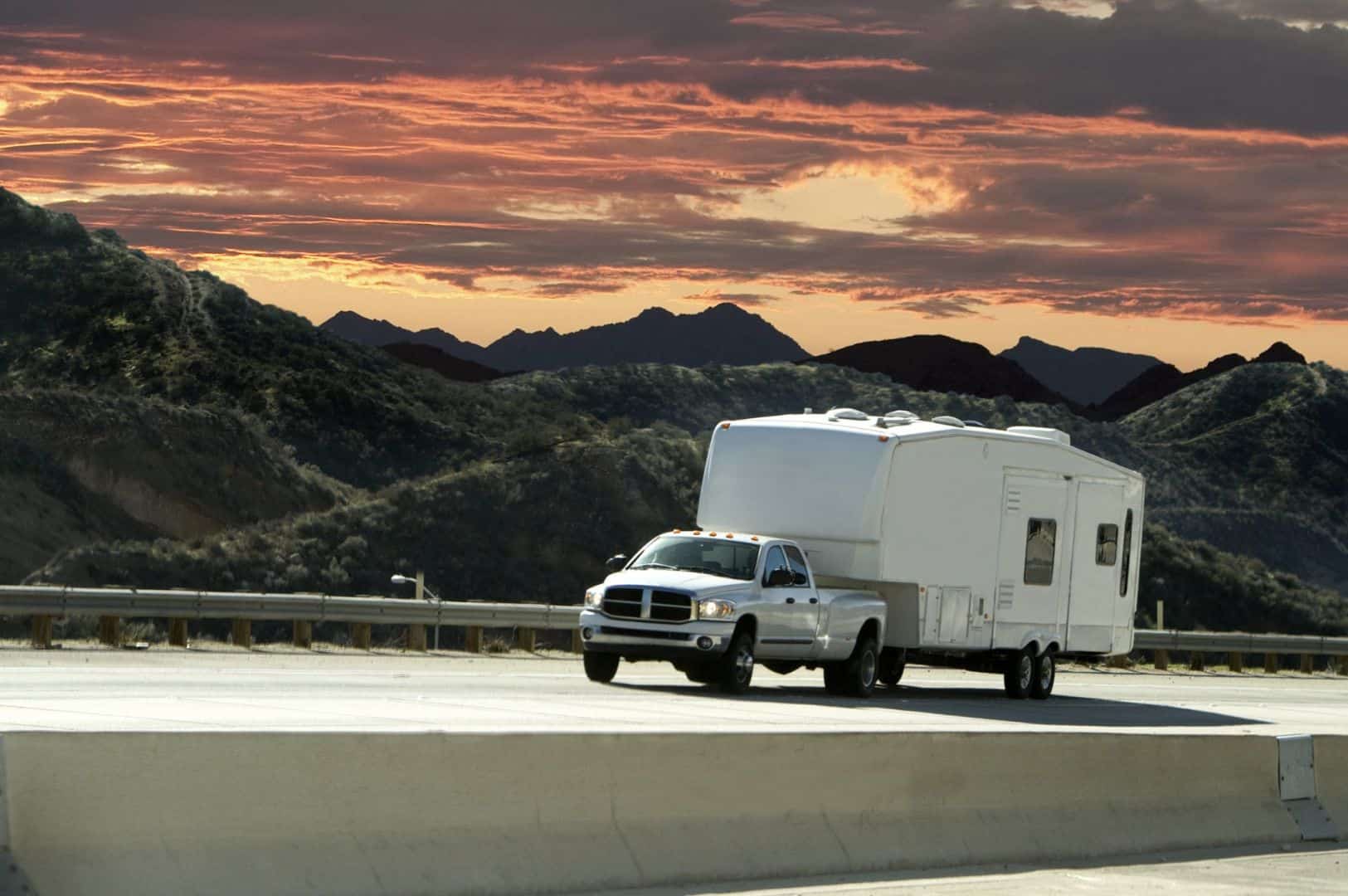Tires are one of those things that are easy to overlook, but they can really make or break your towing experience. When it’s time to replace the rubber on your truck, you must ask yourself the right tires that will really get the job done for your particular RV setup. You can’t just tell your mechanic to slap on whatever’s cheapest or in stock. As any experienced RVer will tell you to find the best truck tires for towing to ensure safe, smooth travels.
There are a gazillion tire options out there, all claiming to be the best. Let’s cut through the noise and discuss about 5 real-world tested truck tires that deliver when you need them most. We’ve picked these based on tons of reviews from actual owners, not just fancy marketing.
We’ll cover your bases whether you’re towing a huge 5th wheel or a lightweight RV. And remember, what works for your neighbor might be totally wrong for your rig. So, get the right one from our list for your setup.

Contents
Truck Tires For Towing: The Basics
Why You Need The Best Truck Tires for Towing
A common question by owners of pickup trucks is whether you need special tires for hauling heavy loads or towing an RV. This is a legit concern, since in general, the best truck tires for towing with the right specifications and sufficient ratings often cost more than tires not rated for towing loads. The short answer is yes, they perform very differently, and you need the best truck tires for towing if you do not want to compromise your safety, as well as your towing experience.
The tires on any automobile have a tremendous impact on many aspects of your driving experience, including noise, how smooth the ride feels, general handling and control, and traction on different road surfaces and in inclement weather conditions like rain or snow. For pickup trucks meant for regular heavy hauling and towing jobs, the tires play an even more important role in ensuring safe and comfortable driving:
Load Carrying Capacity
Your truck tires will have to bear the stress of your tow vehicle as well as the load you’re hauling or towing. Needless to say, the best truck tires for towing need to be tougher to carry these weights.
That is why for hauling and towing operations, you’re going to need more air to support that load. This means that you’ll generally need bigger tires with a more rugged construction. These tires can hold more air and thus, can carry heavier loads on longer distances and rougher terrains.
Superior Traction, Stability and Control
Towing a heavy travel trailer behind means your truck tires need that extra grip to provide sufficient traction so that you have complete control of both your pickup and the rig. Grip is even more crucial when you need to face difficult terrain, like winding mountain passes, offroad, uphills, downhills and/or driving in the rain or snow. If traction is compromised, so is your safety.
Many of the best truck tires for towing are designed with special tread patterns and made with advanced compounds to ensure maximum traction as well as longer tread life. A good tread helps ensure shorter stopping distance and better acceleration performance. Good traction prevents wheel slippage when you accelerate, which is a common reason for road accidents in inclement weather conditions.
Also, when towing, the stiff walls of the best truck tires for towing means there is less swaying and better overall stability, although the ride might feel a bit rougher.
Enhanced Durability Under Harsher Driving
Even without any hauling or towing, LT tires are better for off-roading because the rubber is often made with improved, more heavy-duty compound that can withstand ripping and chipping on rough terrains.
In addition, the extra weight of a hulking pickup plus the heavy load you’re towing also means that you need the best truck tires for towing to withstand that extra stress. For enhanced durability, the best truck tires for towing on the market often boast rugged construction. Some features include extra strong casing for secure towing heavy loads, plus reinforced sidewalls for solid load bearing and better puncture protection.
Types Of Truck Tires For Towing
The world of truck tires for towing is vast and diverse. If you browse through the reviews on Amazon, you will see that changing a set of tires has an enormous impact on the owners’ towing experience, especially if you often have to tow in varying weather conditions and rough terrains while camping. To pick out the best truck tires for your needs, you should know the different types of truck tires as well as important specifications (which will be discussed later in the Buying Criteria section):
- All-terrain tires (A/T): The best all terrain tires for towing have distinctively bigger tread blocks and a more aggressive tread design to allow for more grip when you’re off-roading or driving in the snow, on light mud, sand, and gravel. All-terrain tires usually have the Severe Weather service emblem etched on it. These tires perform great on highways in terms of stability and ride comfort. Many adventurous, rugged campers prefer A/T tires as they look aggressive, have long tread life, offer excellent stability and versatility without being too noisy.
- All-season tires – Unlike A/T tires, all-season tires are designed to perform well on the highway, with symmetrical tread design and circumferential grooves. Even in the rain, all-season tires would provide superb traction.
- All-purpose tires (A/P): These tires are also commonly called Trail tires. They are made to handle mild terrains and will give you average off-road traction, nothing as badass as the all-terrain tires for sure. All-purpose tires are characterized by an overlapping-block tread pattern.
Best Truck Tires for Towing
There are hundreds of options when it comes to light truck tires, each with different selling points, but if we have to pick the very best of them all that deliver superior results in each and every important criteria, the best truck tires for towing have to be the 5 models below.
If you are well researched, dive right in; otherwise, it’s recommended that you skip to the next section to learn the most important buying criteria, that is the crucial ratings or measurements that you need to know to pick out the best truck tires for towing in your case.
1. Nitto Terra Grappler G2 Traction Radial Tire
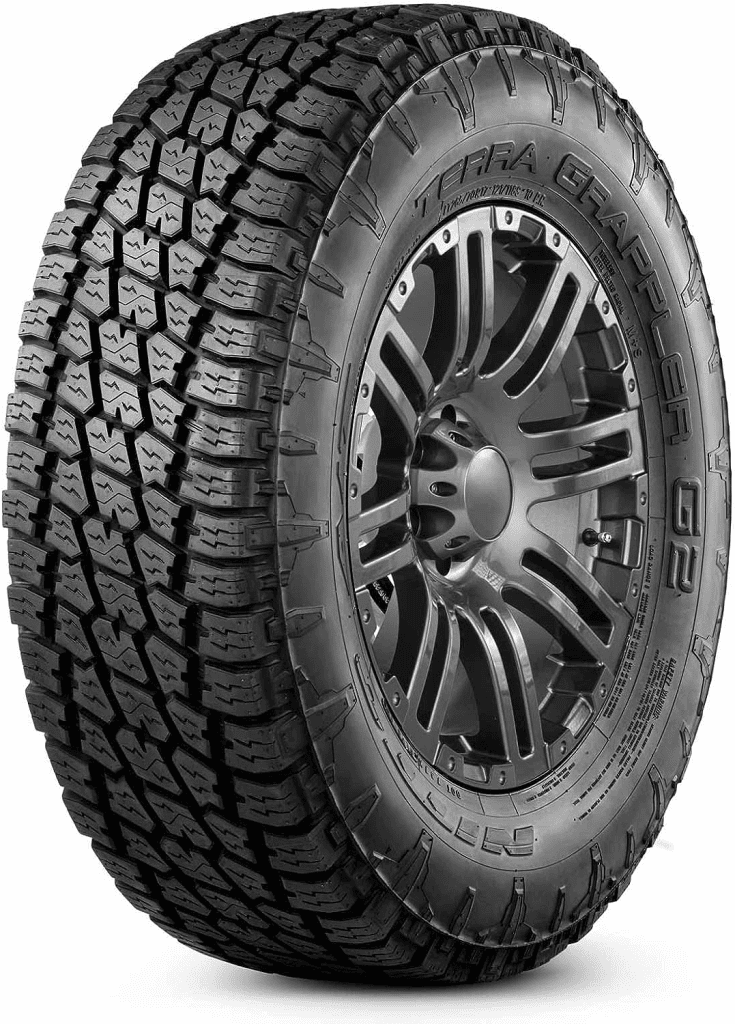
At a glance
| Section Width | 275 Millimeters |
| Tire Diameter | 32.09 |
| Rim Size | 18 Inches |
| Load Capacity | 2756 Pounds |
| Load Index Rating | 116.0 |
| Speed Rating | T |
| Tread Depth | 13/32nds |
| Tire Aspect Ratio | 65.0 |
| Weight | 41.9 pounds |
Why we love it
After using the Nitto Terra Grappler G2 tires on our truck for a couple thousand miles, we can confidently say they are one of the best truck tires for towing a travel trailer.
The tires have an aggressive tread pattern that really grips the road, even when towing heavy loads. We also consider them the best all terrain tires for towing since we’ve driven them on interstates, backroads, and even some light off-roading, and they perform incredibly well in all conditions. The deep tread blocks give great traction on wet roads, which is crucial here in the rainy southern climate.
With a load index of 116, these tires are reinforced to handle over 2,750 pounds each. We’ve hauled some fairly heavy trailers and equipment without any issues. The tires feel sturdy and help stabilize the truck. We also appreciate the quiet, comfortable ride they provide, even when unloaded.
You can drive these tires for hundreds and thousands of miles before they give up. They can last 75k+ miles and that’s impressive durability in our experience.
For the traction, stability, and longevity they provide, they are easily the best truck tires for towing in their price range. Just be sure to have them professionally mounted for optimal safety and performance.
Pros
- Excellent traction and grip, even when towing heavy loads
- Durable tread design
- Reinforced construction handles over 2,750 lbs per tire
- Quiet, comfortable ride when unloaded
- Good performance on wet roads
Cons
- May not handle as well as highway tires at high speeds
- Not optimized for winter driving conditions
- Requires professional mounting for safety
2. Milestar Patagonia M/T Mud-Terrain Radial Tire
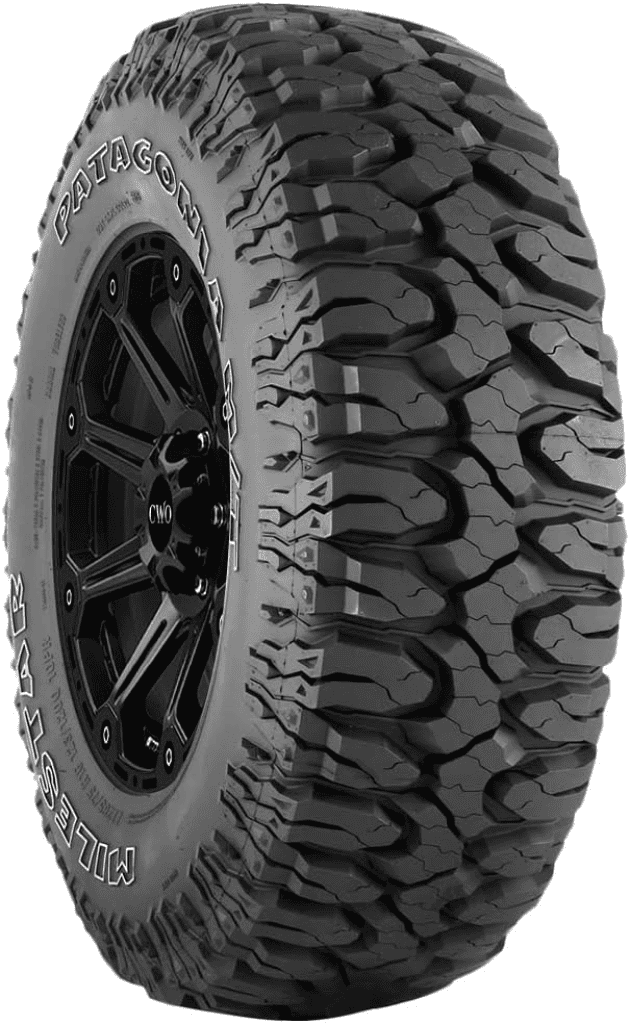
At a glance
| Size | 33X12.50R15LT |
| Section Width | 10.5 Inches |
| Rim Size | 15 Inches |
| Load Capacity | 2,270 Pounds |
| Load Index Rating | 109.0 |
| Speed Rating | Q |
| Tread Depth | 19/32nds |
| Tire Aspect Ratio | 10.5 |
| Weight | 37.9 pounds |
Why we love it
Having the right tires is crucial for control and safety when you’re towing heavy loads. The Milestar Patagonia M/T mud-terrain tires could be the best truck tires for towing a trailer off-road.
The aggressive tread pattern on these tires grips incredibly well, even in muddy or loose soil conditions. We’ve towed our trailer and the tires dig in and provide traction where other all-terrains spin uselessly. The chunky blocks and deep voids fling mud and clear quickly, keeping the tread engaged.
The Patagonia M/T are one of the best truck tires for towing a heavy rig. With a load range of D and capacity of 2,270 pounds each, they provide stability for heavier towing duties.
Our rig feels planted and secure, with no swaying or wandering, even pulling bulky equipment through the backcountry. The stiff sidewalls and reinforced ply construction gives us peace of mind.
Surprisingly, these mud terrains are quiet and smooth on pavement as well. We would have expected more road noise from the aggressive tread, but they handle highway driving better than expected when unloaded.
The only downsides may be somewhat shorter treadwear compared to an all-terrain, and less traction on icy roads. But from a traction and towing perspective, the Patagonia M/T is hard to beat if you need to frequently haul heavy loads off-road. The grip and control they provide make them the best light truck tires for towing.
Pros
- Excellent mud traction and grip for off-road towing
- Aggressive tread pattern clears mud and debris
- Reinforced construction handles over 2,270 lbs per tire
- Provides stability when towing heavy loads
- Surprisingly smooth and quiet on pavement
Cons
- May wear faster than all-terrain tires
- Not optimized for on-road towing
- May hydroplane more easily in wet conditions
3. Travelstar Ecopath AT LT265/70R18 Tire
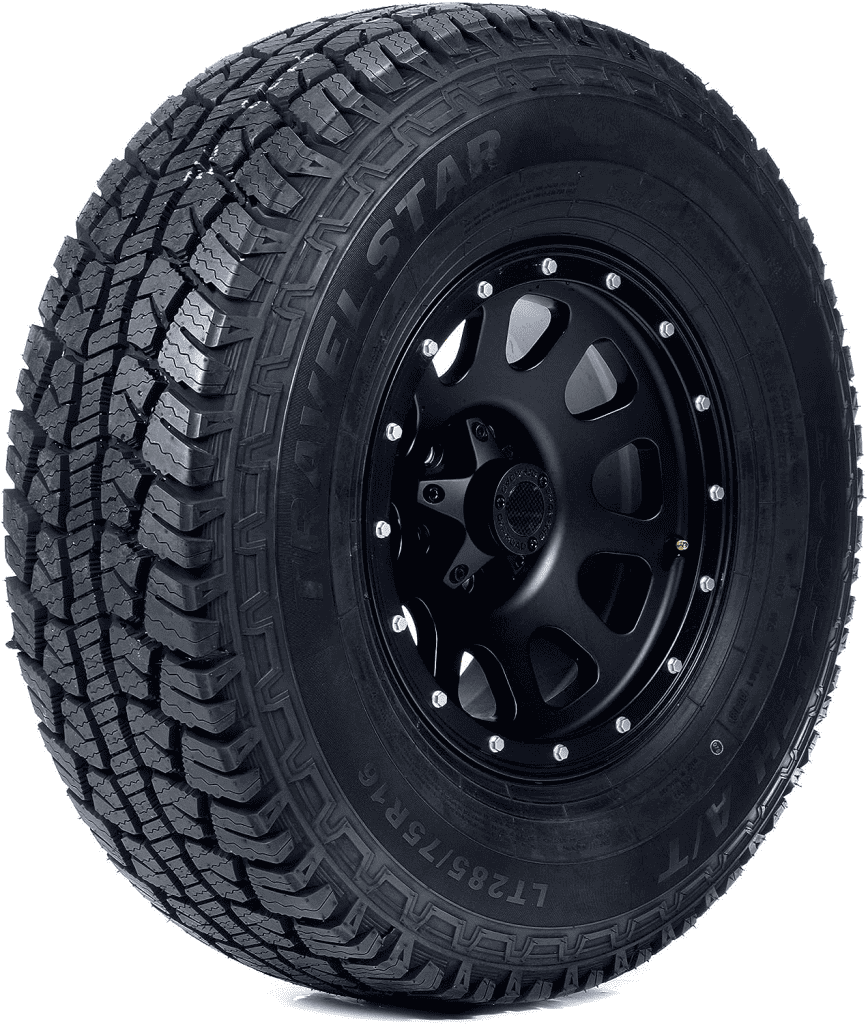
At a glance
| Size | LT265/70R18 124/121S |
| Section Width | 265 Millimeters |
| Rim Size | 18 Inches |
| Load Capacity | 3,527 Pounds |
| Load Index Rating | 124.0 |
| Speed Rating | S |
| Tread Depth | 16.13 32nds |
| Tire Aspect Ratio | 70.0 |
| Weight | 48.6 pounds |
Why we love it
The Travelstar Ecopath AT could be the best truck tires for towing 5th wheel rigs because of their capacity to handle heavy loads. For the same reason, they are also one of the best pickup tires for towing.
The reinforced construction and extra load rating on these LT tires gives us peace of mind when towing. With a capacity over 3,500 pounds each and durable ply construction, they easily handle the weight of a loaded 5th wheel and stabilize our truck.
We’ve logged thousands of miles towing through all kinds of conditions, and the Travelstars provide a stable, solid feel thanks to their sturdy build. We can safely call them the best tires for towing heavy loads.
Another key benefit is their all-terrain tread design, which gives us versatility. The aggressive pattern and angled siping grips well off-road while still being quiet and smooth on the highway. We can tow our 5th wheel to rural campsites and rely on the Travelstars to provide traction on dirt and gravel. Yet they still deliver a comfortable ride on pavement.
For us, the balanced on- and off-road performance is ideal for a tire that needs to tow heavy 5th wheel trailers and handle everyday driving. Our only complaint is that the tread life is a bit shorter than premium tires. But given the affordable price, all-season capability, and reliable wet/dry traction, the Travelstar Ecopath AT is an excellent value choice as the best tires for fifth wheel towing.
Pros
- Reinforced construction handles heavy 5th wheel loads
- Load rating over 3,500 lbs per tire
- All-terrain tread good on pavement and off-road
- Good value for the price point
- Reliable wet and dry traction
Cons
- Treadwear warranty not as long as premium tires
- Not specialized for winter conditions
- Not as durable as more expensive options
4. Falken 28034713 Wildpeak AT3W All Terrain Radial Tire
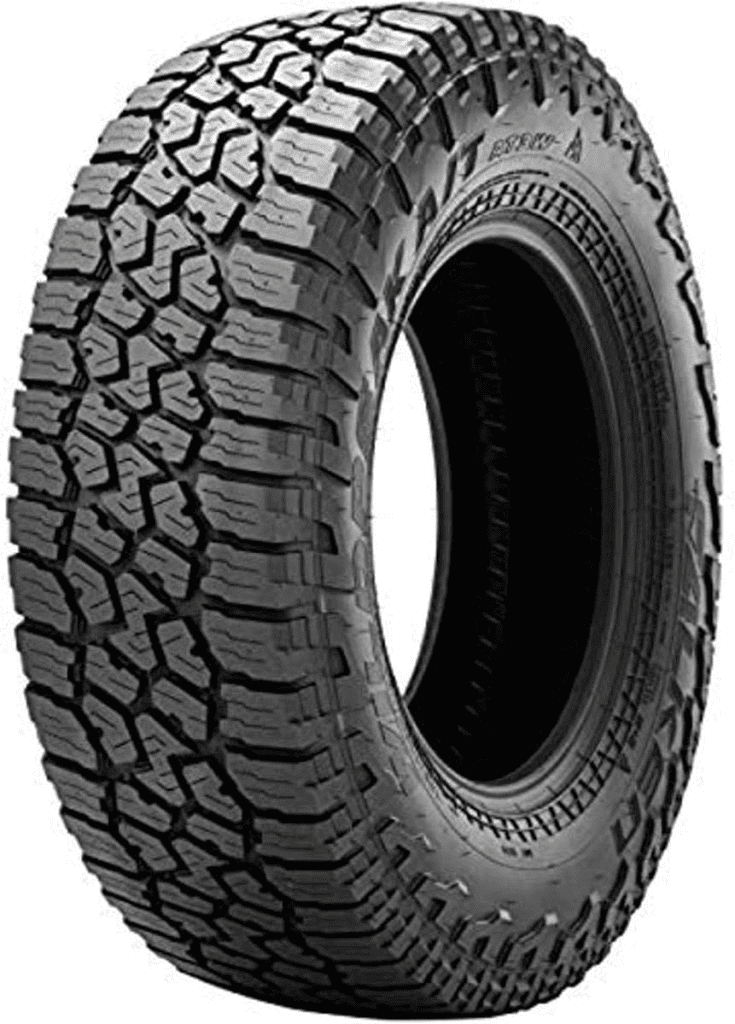
At a glance
| Size | 255/65R17 114T |
| Section Width | 255 Millimeters |
| Rim Size | 17 Inches |
| Load Capacity | 2,601 Pounds |
| Load Index Rating | 114.0 |
| Speed Rating | T |
| Tread Depth | 13 32nds |
| Tire Aspect Ratio | 65.0 |
| Weight | 41.0 pounds |
Why we love it
When you’re living in an RV, it’s crucial to have the right tires on the tow vehicle. We have confidence in the Falken Wildpeak AT3W as the best tires for towing travel trailer units.
The Wildpeak AT3W combines rugged off-road traction with impressive on-road manners, making it a versatile tire for towing. The tread patterns and siped blocks grip well on loose terrain like gravel campsites, providing control when backing up the trailer. The silica tread compound delivers a smooth, quiet highway ride when cruising with a trailer in tow.
With a load rating over 2,600 pounds per tire, the Falken has the reinforced construction to handle a loaded travel trailer. We feel very stable towing, without the swaying or wandering that can happen with weaker tires. The AT3W’s snowflake rating gives us confidence towing in severe winter weather too.
While their 55,000 mile treadwear warranty is lower than more expensive options, it’s still one of the best truck tires for towing if you consider the price. The affordability and the balanced on/off-road performance make it a great value tire for travel trailer needs. We plan to install another set soon to be ready for more camping adventures this season!
Pros
- The tread provides traction off-road and on gravel
- Load rating over 2,600 pounds per tire
- Provides stability when towing in severe weather
- Balanced on-road and off-road performance
- Impressive snowflake rated winter traction
- Reasonable price for the quality
Cons
- Not optimized for dry pavement towing
- Some road noise, especially as tread wears
- May not last as long as premium highway tires
5. MICHELIN Defender LTX M/S All Season Radial Tire
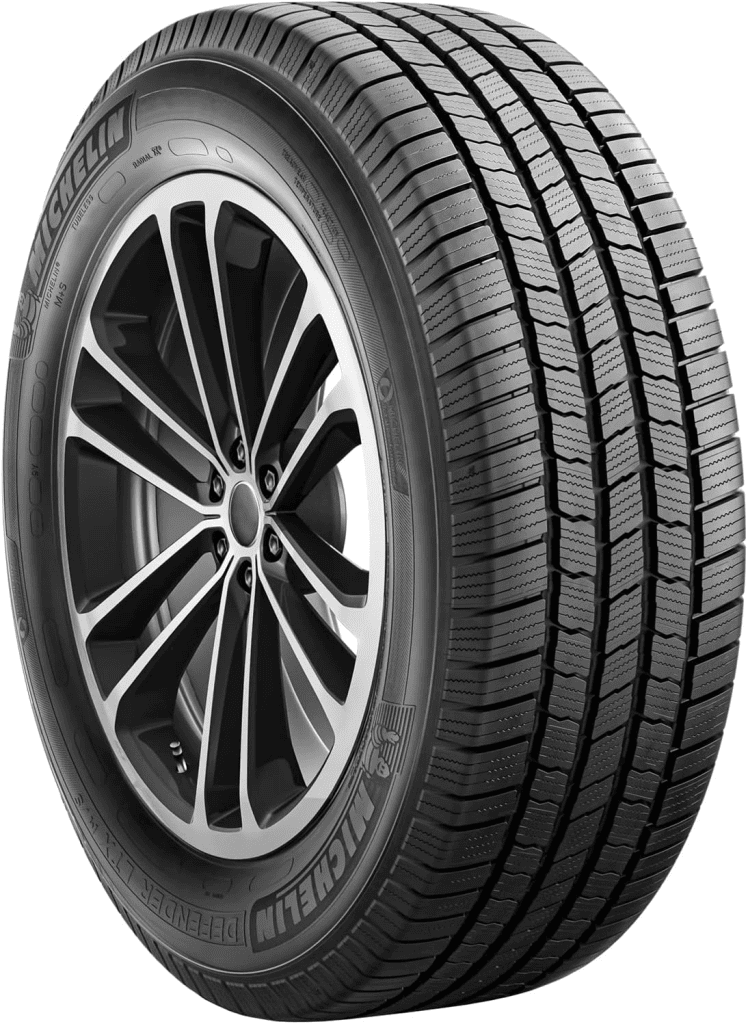
At a glance
| Section Width | 295 Millimeters |
| Tire Diameter | 32.09 |
| Rim Size | 20 Inches |
| Load Capacity | 3,750 Pounds |
| Load Index Rating | 126 |
| Speed Rating | R |
| Tread Depth | 13.5 32nds |
| Tire Aspect Ratio | 60.0 |
| Weight | 54 pounds |
Why we love it
After logging over 50,000 miles with Michelin Defender LTX tires on our tow rig, we can pretty much vouch for them as the best tires for towing RV.
The Defender LTX is engineered specifically for high-load applications like RVs. The reinforced MaxTouch construction provides strength to handle the weight of a loaded camper, while the wide tread distributes it evenly. This gives us stability and control while towing, even at highway speeds. The tires feel planted and reduce swaying compared to many other brands we’ve tried.
We also appreciate their wet weather traction and snow performance. The evolving tread design adapts as it wears to maintain grip in varying conditions. However, these are non-winter tires, so avoid driving them in snowy and completely wet conditions.
While not the cheapest option, the Michelins are worth the investment for us. Their 71,000 mile (115,000 kilometers) treadwear warranty ensures years of reliable service towing heavy loads. These are one of the best truck tires for towing.
Pros
- Load rating over 3,700 lbs per tire
- Provides stability and control when towing
- Adapting tread maintains grip as it wears
- Good value given long tread life
Cons
- Expensive upfront cost
- May be overkill for light RV towing
How To Choose The Best Truck Tires for Towing: Buying Criteria
Important tire specifications crucial for choosing the best truck tires for towing are denoted on a tire’s sidewall. Below are all the measurements or terms you need to know, and how to understand a tire’s specifications:
LT Tires
LT-metric tires, or “light truck tires”, are the best tires for towing heavy loads. LT tires are specifically designed with stronger walls, and sometimes have an extra steel belt and a deeper tread, so that they can handle heavy towing or hauling jobs with a light truck.
Meanwhile, another type of tire that is P-metric tires or “passenger tires” are often cheaper than LT tires, but they are made for passenger vehicles only. On normal commuting operations, they offer a smoother ride than LT tires due to their softer sidewalls, but they should only be used if you never do any heavy towing or cargo hauling. You cannot put P-metric tires on a truck that is factory rated for LT tires.
You’ll also come across ST tires. These have even higher load capacity than LT tires and are wider, oversized tires designed for vehicles carrying extra heavy cargo loads, boats and RVs. Using these on your truck is an overkill, since truck tires are not meant to handle the type of weight of a travel trailer or a big boat.
Size
For hauling and towing operations, you’re going to need more air to support the heavy loads. This means that you’ll generally need bigger tires with a more rugged construction. These tires can hold more air and thus, can handle heavier loads on longer distances and rougher terrains.
Sizing specifications include tire width, wheel diameter and aspect ratio, all of which are important calculations in tire fitting. The aspect ratio measures the height of the sidewall from wheel rim to top of the tread, as a percentage of tire width. In general, a tire with a lower aspect ratio typically would offer better lateral stability and overall better performance.

Ply Rating
A tire ply rating refers to how many layers, or plies, have been used in the tire’s construction. It directly translates to a tire’s strength and durability. In other words, ply rating is used to identify a given tire’s load limits and inflation limits.
In the early days, a tire’s plies were made of cotton. Modern tires are no longer made from cotton. Instead, they are made from more heavy-duty materials so that fewer plies can be used to offer much more strength. Therefore, the term “ply rating” no longer refers to the actual number of plies a tire has, but indicates an equivalent strength compared to earlier cotton-plies construction.
The piles of tires these days are usually made of rubber and cord layers. The best truck tires for towing a 5th wheel will be a ten ply. A ten-ply tire is not made up of ten layers of rubber, but consists of only a few plies that offer the equivalent strength of 10 conventional cotton-constructed plies.
Load Range
Load range is basically the same thing as the ply rating, albeit the former comes from an earlier era in the history of automobiles. Both ratings are used to identify a tire’s load and inflation limits. A tire specification chart can list both ratings side by side to represent a tire’s maximum load carrying capacity at maximum allowable air pressure.
Look for letter symbols on your truck tire’s sidewall: B, C, D, and E. This is its load range. The letter tells you how tough your tire is as well as the allowable tire pressure. Here’s how to convert between load range and the corresponding ply rating:
- Load Range B – Ply Rating 4: Max Load Pressure 35 psi
- Load Range C – Ply Rating 6: Max Load Pressure 50 psi
- Load Range D – Ply Rating 8: Max Load Pressure 65 psi
- Load Range E – Ply Rating 10: Max Load Pressure 80 psi
- You’ll sometimes see tires rated with Load Range F – Ply Rating 12 (although not as common): Max Load Pressure 95 psi
While a 10-ply tire is considered the best truck tires for towing in terms of strength and load capacity, the best tire should have load range E. Load range E tires allow your truck or SUV to handle heavier loads on longer distances, all the while still giving you the benefits of a comfortable ride with minimal hums and vibrations on rough terrains.
Load Index and Load Capacity
Load index refers to the maximum weight that a truck tire can safely handle when inflated at the optimal tire pressure. Load index can be any number from 75 to 150, which translates to a load capacity ranging from 852 pounds to 7,385 pounds. In other words, load index can be directly translated to load capacity, and the higher the load index, the higher the load carrying capacity.
While passenger car tires have only one load index, most of which ranging from 75 to 100, light truck tires used for towing always have two load indexes higher than 100, since this type of tires are often used on vehicles with dual rear wheels.
For example, an LT tire with a load index of 121/117 will have a load capacity for a single tire of 3,197 pounds and a load capacity for two tires of 2,833 pounds. The latter number is smaller than the former to make sure that the vehicle can continue to carry the load in case one tire fails.
How To Read Tire Specs
The above tire ratings as well as other important information about a particular tire can be found on the tire’s sidewall, but you need to be able to understand how they are denoted.
- Sizing: On the truck tire’s sidewall, you will find a string of alpha-numeric codes, for instance LT215/65R15 121/117L. The longest part, LT215/65R15, denotes the tire type (LT tire), width (215mm), aspect ratio (65%), construction (rubber), and tire diameter (15 inches).
- Load index: Right after this code are two numbers followed by a letter. The two numbers denote the tire’s load index, here is 121/117, referring to a load capacity for a single tire of 3,197 pounds and a load capacity for two tires of 2,833 pounds.
- Speed rating: After the load index is the tire’s speed rating, in this case L, 75 mph or 120 km/h. This is the maximum speed that a tire can handle before its performance and thus your safety is compromised. While most truck tires are rated for 75 mph with a recommended tire pressure to match that speed, speed rating runs from A to Z, ranging from 5km/h (3mph) to over 300 km/h (186 mph).
Some tires may also have Uniform Tire Quality Grading, which tells you its traction grade and temperature grade:
- Traction grades include AA, A, B and C, with AA performing best in wet conditions.
- Temperature grade refers to how well the tires dissipate heat at various speeds. A-rated tires operate well at speeds over 115 mph, while the optimal range for B-rated tires is between 100 mph and 115 mph, and C tires perform best at between 85 mph and 100 mph.
Best Truck Tire Brands
Michelin
Michelin’s tried and tested lineup offers some of the best truck tires for towing in a variety of driving and towing conditions. Although truck tires from the brand are some of the priciest tires you’ll find, at around $250 per tire minimum, buyers testify that they are well worth the investment.
Michelin offers some of the most well-rounded and heavy duty all-season truck tires, which deliver a comfortable ride in any vehicle plus superior traction in snow and rain, all the while being very quiet when traveling at higher speeds.
Bridgestone
When it comes to a heavy-duty commercial grade tire, Bridgestone offers some of the very best truck tires for towing on the market. Bridgestone truck tires offer impressive traction as well as excellent stability and handling even on snowy or wet roads.
The brand also keeps incorporating customers’ feedback to bring about improvements, including new tread design to provide more biting edges on different terrains.
Goodyear
Goodyear is another household name when it comes to the best truck tires for towing. If you’re looking for a rugged tire that is ideal for towing heavy loads as well as off-roading, you will love Goodyear’s truck tires.
They are known for superb traction even on the harshest road conditions, and will last a very long time even if you travel off-road often, thanks to their rugged construction from a special compound that resists tearing and chipping.
The brand’s truck tires also boast extra strong casing, so they perform consistently when towing heavier cargo. While some buyers have noted that some of their most durable and high-capacity truck tires are not very quiet on the road, it’s not at all a deal breaker when performance is of utmost importance.
Cooper
Cooper offers high performance truck tires for towing your RV or for hauling heavy loads that are surprisingly quiet and offer confident handling on the highway, even at higher speeds.
The brand is loved for their unique tread design patterns, including alternating tread block geometry. These distinctive tread designs ensure more even tread wear, a longer service life and can even shunt water away from the contact area.
BFGoodRich
BFGoodrich is known for its all-terrain tire line launched 15 years ago, which is now in its 4th generation already. This line is engineered for SUVs, jeeps, and pickup trucks and delivers like a dream in both on and off-road use.
Some superior features that you will love from the best truck tires for towing from BFGoodRich includes interlocking tread block pattern achieved by digital optimization, reinforced double steel belts, improved sidewall rubber compound, Goodrich’s patented cable sidewall layer construction, and side biter lugs extended rubber blocks on the sidewall for superior traction and stability.
Bonus: Truck Tires For Towing – Care Guide
There’s no point in investing in the best truck tires for towing if you don’t take care of them properly. Here are the most important things to look out for:
Maintaining Proper Tire Pressure
The best truck tires for towing must be maintained with the optimal tire pressure. Both over-inflation and under-inflation will hurt your braking and handling, waste fuel, wear out your tires faster and unevenly, or even worse, result in premature tire failures, which would compromise your safety.
Under-inflated tires means more contact area with the road, which would build up excess heat and result in tire failure. Over-inflated tires means a rougher ride, and higher chance of tire damage when you drive on rough terrain, as each bump and vibration is amplified. Both result in uneven tread wear, which means you’d need to replace your tires sooner.
To help keep your truck tires in tip top shape, invest in a tire-pressure gauge so that you can check the pressure of your tires before/while starting on any long trip and at least once a month. Before checking the tire pressure, make sure your pickup has been parked for three or more hours to get an accurate read, since the tires will not be “hot”.
Equipping an RV tire pressure monitoring system is another great option. This device issues the tire pressure information of real-time to the drivers by using either a gauge, a simple low-pressure warning light or a pictogram display. With a TPMS, RV campers always have quick information about tire pressure which can help them to avoid unexpected accidents related to the flat tires.
The optimal tire pressure for your tires is NOT the “max pressure” number found on the tire sidewall, as many drivers assume. “Max pressure” is the maximum amount of pressure that a given tire can handle without damage.
Meanwhile, the recommended tire pressure by your automaker is the safe operational level to achieve the best combination of traction, handling and stability, ride comfort, fuel economy and tire lifespan. The recommended psi can be found in your owner’s manual and also located on a sticker or placard on the driver’s-side door or fuel-filler door or inside the glove compartment.
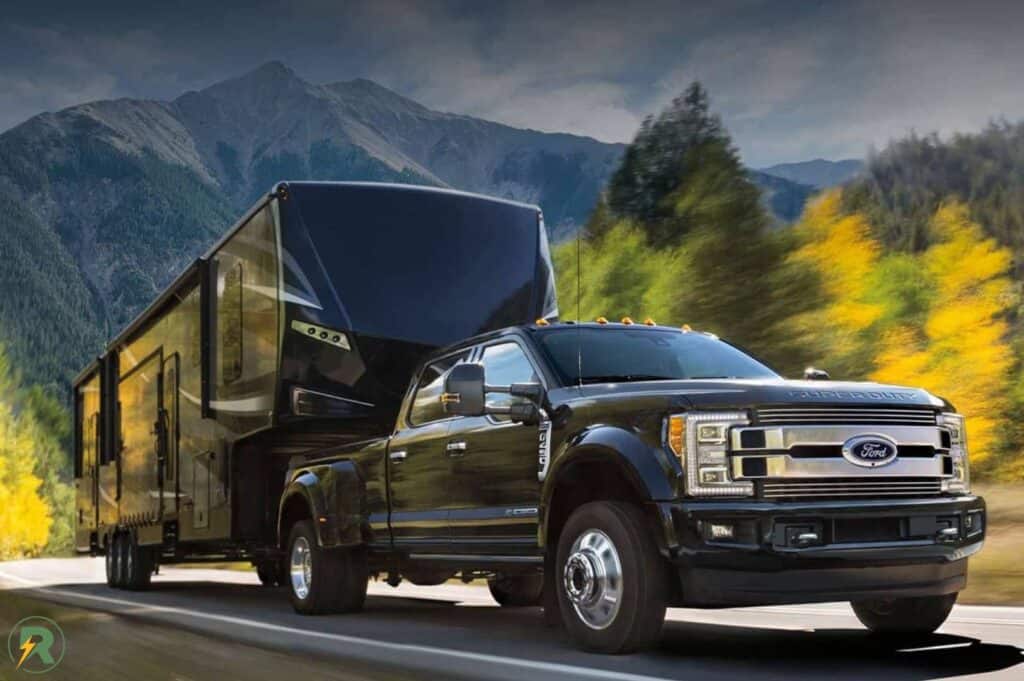
Regular Inspection
Regular inspection is key, so always check your tires once or twice every month to keep track of its condition and always before a trip, regardless of the distance.
Look for holes and punctures that will cause the air pressure to be depleted, signs of uneven tread wear, any damage to the rim or any debris that might be lodged in your tires that might hurt its structural integrity.
Tire Rotation
The tread on your four truck tires would not wear evenly, most notably between the front and the rear wheels. Depending on whether your car is front-, rear-, or all-wheel drive, sometimes the front wheels or the rear wheels will have to work harder due to steering, braking and withstanding the weight of the axle.
Rotating your wheels periodically, at least once every six months, helps even out the tread wear of your truck tires and thus making them last longer as well as ensuring safer driving.
Driving Habits
Last but not least, try not to drive like a madman, including abrupt braking and acceleration, cutting in corners sharply and running over curbs or objects. These create more stress on your tires and might cause an internal steel belt to snap or might damage other parts, all leading to a shorter tire lifespan or premature tire failure.
You might not feel or see this right away, but if you want the most miles out of your expensive set of truck tires, you better treat them right.
FAQs About Best Pickup Tires For Towing
1. Do truck tires matter for towing travel trailers?
The tires on any automobile have a tremendous impact on many aspects of your driving experience, including noise, how smooth the ride feels, general handling and control, and traction on different road surfaces and in inclement weather conditions like rain or snow. For pickup trucks meant for regular heavy hauling and towing jobs, the tires play an even more important role in ensuring safe and comfortable driving.
Towing a heavy travel trailer behind means your truck tires need that extra grip to provide sufficient traction so that you have complete control of both your pickup and the rig. Grip is even more crucial when you need to face difficult terrain, like winding mountain passes, offroad, uphills, downhills and/or driving in the rain or snow. If traction is compromised, so is your safety. Many of the best truck tires for towing are designed with special tread patterns and made with advanced compounds to ensure maximum traction as well as longer tread life.
When towing, the stiff walls of the best truck tires for towing means there is less swaying, although the ride might feel a bit rougher. Even without any hauling or towing, LT tires are better for off-roading because the rubber is often made with improved, more heavy-duty compound that can withstand ripping and chipping on rough terrains.
In addition, the extra weight of a hulking pickup plus the heavy load you’re towing also means that you need the best truck tires for towing to withstand that extra stress. For enhanced durability, the best truck tires for towing on the market often boast rugged construction. Some features include extra strong casing for secure towing heavy loads, plus reinforced sidewalls for solid load bearing and better puncture protection.
2. Are LT tires better for towing?
LT tires are the best tires for towing heavy loads. LT tires are specifically designed with stronger walls, and sometimes have an extra steel belt and a deeper tread, so that they can handle heavy towing or hauling jobs with a light truck.
Meanwhile, P-metric tires are often cheaper than LT tires, but they are made for passenger vehicles only. On normal commuting operations, they offer a smoother ride than LT tires due to their softer sidewalls, but they should only be used if you never do any heavy towing or cargo hauling.
You cannot put P-metric tires on a truck that is factory rated for LT tires. However, you can put LT tires on a vehicle rated for P-metric tires. That said, note that for regular city driving, P-metric tires on a P-metra rated truck would have better handling and generally a longer overall service life.
3. Do you need special tires for towing?
Yes, you need tires rated for the kind of towing jobs you usually do. Look at a tire’s specifications to determine whether it is heavy duty enough for what you’re planning to tow and the usual road or weather conditions that you often face on the road. The best truck tires for towing must be LT tires, with the appropriate ratings to facilitate your towing needs, which includes the weight of your pickup and trailer, the type of road and weather conditions you often tow in.
4. What’s a tire ply rating?
A tire ply rating refers to how many layers, or plies, have been used in the tire’s construction. It directly translates to a tire’s strength and durability. In other words, ply rating is used to identify a given tire’s load limits and inflation limits.
In the early days, a tire’s plies were made of cotton. Modern tires are no longer made from cotton. Instead, they are made from more heavy-duty materials so that fewer plies can be used to offer much more strength. Therefore, the term “ply rating” no longer refers to the actual number of plies a tire has, but indicates an equivalent strength compared to earlier cotton-plies construction.
5. Is a 10 ply tire good for towing?
10 is the highest ply rating for tires. The higher the ply rating, the stronger the tire is and the higher its load capacity. That is, a set of 10 ply tires allow you to tow the heaviest weight on the longest distances without sacrificing tire lifespan, stability and ride comfort.
The best 10 ply truck tires should be able to carry a minimum weight of 3,000 pounds per tire, or a total of 12,000 pounds. 10 ply truck tires are made with a firmer, more durable rubber compound, so they can better withstand ripping and chipping when traveling off-road.
6. Can I put truck tires on my RV?
No, LT tires are designed to be used on the towing vehicle only, never travel trailers and fifth wheels. The special tires for RVs are called ST service tires, which come in different load ratings to cater for varying trailer weights.
